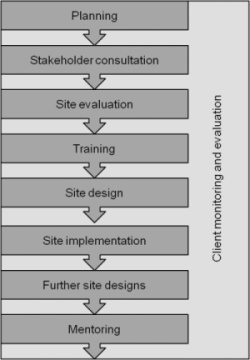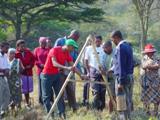|
Project Description
The project entailed the development of some 8 ha of organic vegetable production for two groups of historically disadvantaged farmers within Ndwedwe Municipality, which included the formalisation of the two groups and the establishment of market linkages with organic retailers.
Project Brief
The brief by the Department of Economic Development & Tourism (DEDT) was to develop at least two groups of emerging organic farmers in the Ndwedwe Municipality to supply the growing organics retail trade. My proposal as the lead consultant of a consortium was accepted by DEDT and entailed the holistic development and support for two groups of farmers by providing training in Permaculture and organic farming systems, the on-site establishment / improvements to existing fields, organic certification, arrangements with retailers via organic suppliers, and, mentoring for at least 6 months after project completion.
Design Process
The design process entailed project planning, stakeholder consultation, site evaluation, training, site design, site implementation, further site designs, mentoring, and, client monitoring and evaluation, as shown in Figure 1.
Figure 1 - Design Process

A detailed project plan was initially undertaken by the project team so that we all understood our respective roles, responsibilities and resources for the project. This followed with a stakeholder consultation process which was designed to sensitize community leaders and civil servants from the Ilembe District Municipality, the Ndewdwe Municipality, and, the Department of Agriculture & Environmental Affairs (DAEA) about low external sustainable agriculture (LEISA); the environmental benefits of organic farming practices; and, the economic development opportunities for the growing organics market. Once consulted, the community leaders and civil servants directed the project team to various community based agricultural schemes with potential for organic farming. The project team then evaluated several schemes and chose two with potential that could be developed into organic farming projects given the available resources and contract value, namely, the Makhuluseni and Vukuzakhe projects.
The farmers of the two project areas and civil servants from the aforementioned government entities were then trained in Permaculture and organic farming systems, as well as, organic certification standards and maintenance of internal quality control systems. Further training was undertaken on site as projects were co-designed and thereafter implemented by community members. The implementation entailed improvements to existing fields by establishing rainwater harvesting swales planted with vetiver grass; soil improvements through composting, mulching, pioneer plants, and, application of rock dust and effective micro-organisms (EMs). One of the project highlights was the cross-visitation of the two Ndwedwe farmers groups with Ezemvelo Farmers Association from the Umbumbulu area, which is a well established community based organic farming association that regularly supplied organic retailers via Assagay Organics. This visitation was used to share project experiences and gave much encouragement to all parties.
The two project areas were formalised into farmers associations for which organic certification was arranged with AFRISCO (www.afrisco.net). The marketing and logistical arrangements were then made with Assagay Organics and Earth Mother Organics. At the time, Assagay Organics was a packhouse that had supply contracts with Woolworths, which is one of the leading retailers in South Africa and also a very strong supporter of organic products (www.woolworths.co.za), whilst Earth Mother Organics (www.earthmother.co.za) is a leading fresh produce stall holder at the Shongweni Farmers Market.
The close out process for the project entailed the preparation of two funding applications to continue and also expand the momentum of these two projects. The one funding application was to the DAEA Landcare Programme, under which guise organic farming projects could be considered, whilst the other funding application was to the Primary Agricultural Sector Training Authority (PAETA) for the mentoring of emerging farmers. Unfortunately, the funding for the Landcare Programme dried up, but the PAETA funding was eventually approved. The PAETA funding managed to continue on-site training, mentoring and some market logistics support.
Project Status
Both these projects are still producing organic vegetables, but market linkages to Woolworths have broken down due to logistical challenges within the groups and lack of co-ordinated government assistance.
Learning Experience
The major lesson from this project is the need for economies of scale and thereafter ongoing support to ensure that such projects remain successful and sustainable. The cross-visitation between the two Ndwedwe farmers groups and the Ezemvelo Farmers Association provided much encouragement about the market potential for organics and also contributed to the sharing of organic farming practices and exchange of organic seeds.
Unfortunately, co-operative governance cannot be relied upon to maintain continuity of development and support for emerging farmers. This means that other more reliable and sustainable support mechanisms need to be developed to maintain this continuity. To this end, simple workshops arranged amongst farmers groups to talk about their progress and challenges, with facilitation by Permaculture type NGOs, will realise simple, creative and sustainable solutions, similar to the cross-visitation workshop described above.
A key policy recommendation arising from this project was the need for “farmers support centres” which provide for local training facilities, co-ordination of local agricultural production, seed centre, local depot, a value adding facility, and, a micro-finance facility.
It is interesting to observe that farmers from the Ezemvelo Farmers Association and the Makhuluseni Farmers Association both cultivated their own fields and were relatively more successful farmers, whilst the Vukuzakhe Farmers Association cultivated communal land which resulted in smaller returns per farmer. This observation was not surprising and reinforces the concept that cultivation of communal land usually results in complex socio-dynamics, and should rather be parcelled into allotments that directly earn a return for farmers. Under an allotment scheme, farmers can more readily co-operate amongst themselves for the harvest, storage, marketing, distribution, etc.
Documentation
|
 |